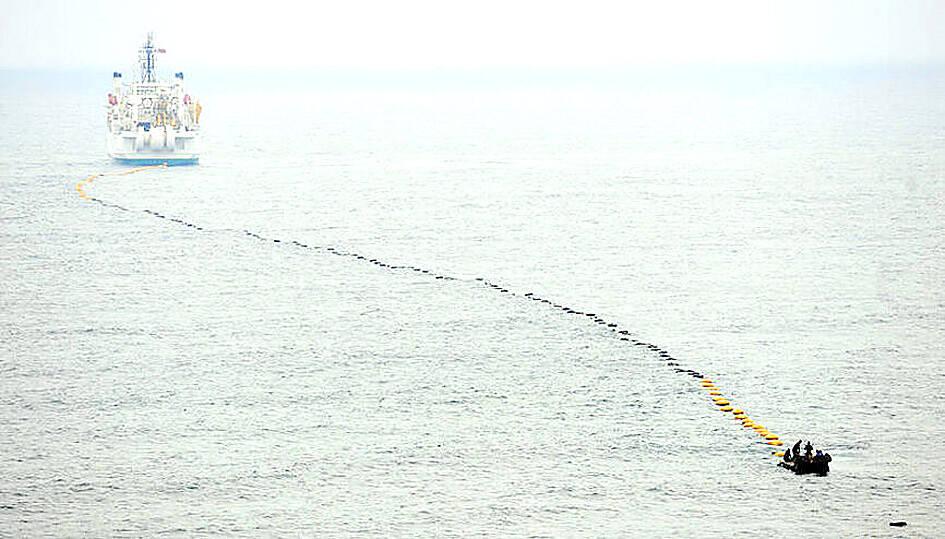Two undersea cables connecting Lienchiang County (Matsu) with Taiwan proper were disrupted due to “natural deterioration” and could be repaired by next month, the Ministry of Digital Affairs said today.
The No. 3 Taiwan-Matsu cable was obstructed on Wednesday last week, and the No. 2 Taiwan-Matsu cable was disrupted this morning at 5am, Chunghwa Telecom said today.
The Ministry of Digital Affairs held a news conference at 11am to explain the situation.

Photo: Taipei Times
Chunghwa Telecom activated microwave communications within one hour of the second cable’s disruption at the ministry’s request, Deputy Minister of Digital Affairs Chiueh Her-ming (闕河鳴) said.
Communications should not be impacted, as the current microwave bandwidth is 12.6Gbps, which is higher than Matsu’s daily peak bandwidth of 9.5Gbps, Chiueh said.
Bandwidth would be prioritized for essential public services such as government agencies, banks and hospitals to ensure they are not disrupted, he said.
During the Lunar New Year holiday, people could still withdraw money from ATMs and online transactions would remain uninterrupted, he added.
The ministry has nine asynchronous satellite devices in Matsu that would serve as backup microwave channels for the Lienchiang County Government, Chiueh said.
No “suspicious” ships were detected when the cables went offline, he said.
Natural deterioration was the likely cause, but cases of ships damaging Taiwan's sea cables have risen in recent years, he added.
So far this year, Taiwan has reported four cases of disruptions in undersea cables, compared with only three both last year and in 2023, Chiueh said.
In 2023, the two undersea cables connecting Lienchiang were cut, disconnecting the Internet.
Authorities said two Chinese vessels caused the disruption, but that there was no evidence that Beijing deliberately tampered with the cables.
Taiwan has since worked to boost its communication resilience for emergencies including a conflict with China, such as a trial program to use low-Earth orbit satellites for remote areas including Lienchiang.

The Central Election Commission has amended election and recall regulations to require elected office candidates to provide proof that they have no Chinese citizenship, a Cabinet report said. The commission on Oct. 29 last year revised the Measures for the Permission of Family-based Residence, Long-term Residence and Settlement of People from the Mainland Area in the Taiwan Area (大陸地區人民在台灣地區依親居留長期居留或定居許可辦法), the Executive Yuan said in a report it submitted to the legislature for review. The revision requires Chinese citizens applying for permanent residency to submit notarial documents showing that they have lost their Chinese household record and have renounced — or have never

Taiwan has secured another breakthrough in fruit exports, with jujubes, dragon fruit and lychees approved for shipment to the EU, the Ministry of Agriculture said yesterday. The Animal and Plant Health Inspection Agency on Thursday received formal notification of the approval from the EU, the ministry said, adding that the decision was expected to expand Taiwanese fruit producers’ access to high-end European markets. Taiwan exported 126 tonnes of lychees last year, valued at US$1.48 million, with Japan accounting for 102 tonnes. Other export destinations included New Zealand, Hong Kong, the US and Australia, ministry data showed. Jujube exports totaled 103 tonnes, valued at

A magnitude 5.6 earthquake struck off the coast of Yilan County at 12:37pm today, with clear shaking felt across much of northern Taiwan. There were no immediate reports of damage. The epicenter of the quake was 16.9km east-southeast of Yilan County Hall offshore at a depth of 66.8km, Central Weather Administration (CWA) data showed. The maximum intensity registered at a 4 in Yilan County’s Nanao Township (南澳) on Taiwan’s seven-tier scale. Other parts of Yilan, as well as certain areas of Hualien County, Taipei, New Taipei City, Taoyuan, Hsinchu County, Taichung and Miaoli County, recorded intensities of 3. Residents of Yilan County and Taipei received

BIG SPENDERS: Foreign investors bought the most Taiwan equities since 2005, signaling confidence that an AI boom would continue to benefit chipmakers Taiwan Semiconductor Manufacturing Co’s (TSMC, 台積電) market capitalization swelled to US$2 trillion for the first time following a 4.25 percent rally in its American depositary receipts (ADR) overnight, putting the world’s biggest contract chipmaker sixth on the list of the world’s biggest companies by market capitalization, just behind Amazon.com Inc. The site CompaniesMarketcap.com ranked TSMC ahead of Saudi Aramco and Meta Platforms Inc. The Taiwanese company’s ADRs on Tuesday surged to US$385.75 on the New York Stock Exchange, as strong demand for artificial intelligence (AI) applications led to chip supply constraints and boost revenue growth to record-breaking levels. Each TSMC ADR represents